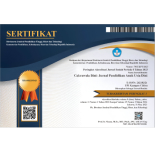PENGARUH REGULASI EMOSI TERHADAP PERILAKU PROSOSIAL ANAK USIA DINI
Abstract
Abstrak: Penelitian ini bertujuan untuk mengetahui pengaruh pengambilan perspektif dan regulasi emosi terhadap perilaku prososial pada anak usia dini. Pendekatan penelitian menggunakan penelitian kuantitatif dengan jenis studi expo facto dengan pengambilan data secara survey. Pengumpulan data pada penelitian ini menggunakan kuesioner yang ditunjukkan kepada guru kelas untuk memperoleh data regulasi emosi pada anak, dan perilaku prososial menggunakan wawancara yang ditunjukkan kepada anak. Hasil penelitian menunjukkan bahwa regulasi emosi berpengaruh signifikan terhadap perilaku prososial anak usia dini dengan p=0,000 (p<0,05), artinya regulasi emosi dapat memprediksikan perilaku prososial pada anak usia dini; regulasi emosi memberikan sumbangan efektif sebesar 8,5% terhadap perilaku prososial
Kata Kunci : regulasi emosi, prososial, anak usia dini
Full Text:
PDF (Bahasa Indonesia)References
Battistich, V. (2003). Effects of a school-based program that enhance prosocial development on children’s peer relations and social adjustment. Journal of Research in Character Education, 1 (1), 1–16
Dumova, T. (2006). Prosocial learning. International Journal of Learning, 12 (9), 184-194
Eisenberg, N. & Mussen, P.H. (1989). The Roots of prosocial behavior in children. Inggris: Cambridge University Press
Eisenberg, N., & Fabes, R.A. (1992). Emotion, regulation, and the development of social competence. In M. S. Clark (Ed.), Review of personality and social psychology. Emotion and Social Behavior (Vol. 14, pp. 119–150). Newbury Park, CA: Sage
Ensor, R., Spencer, D., & Hughes, C.. (2011). “You Feel Sad ?” Emotion understanding mediates effects of verbal ability and mother-child mutuality on prosocial behaviors: findings from 2 years to 4 years. Journal Social Development, (20) 1 , 93-110
Fabes, R. A., Eisenberg, N., Jones, S., Smith, M., Guthrie, I., Poulin, R., Friedman, J. (1999). Regulation, emotionality, and preschoolers’ socially competent peer interactions. Journal Child Development. 70(2), 432–442
Friedrich, L. K., & Stein, A. H. (1973). Aggressive and prosocial television programs and the natural behavior or preschool children. Monographs of the Society for Research in Child Development, 38 (151), 1-63
Gross, J.J. (2014). Handbook of emotion regulation. New York: The Guilford Press
Kalpidou, M.D., Power, T.G., Cherry K.E. & Gotfried N.W.(2004). Regulating of emotion dan behavior among 3 and 5 years old. The Journal of General Psychology,131(2), 159
Lockwood, P.L., Cardoso,A.S., Viding, E. (2014). Emotion regulation moderates the association between empathy and prosocial behavior. Journal Division of Psychology and Language Sciences, 9 (5), 1
Marion, M. (2015). Guidance of young children. Amerika: Pearson
Morris, A. S., Silk, J. S., Steinberg, L., Myers, S. S., & Robinson, L. R. (2007). The role of the family context in the development of emotion regulation. Journal Social Development, 16(2), 361-388
Santrock, J.W. (2007). Perkembangan anak (edisi ketujuh). Jakarta: Erlangga
Schatz, J.N., L.E. Smith, J.G. Borkowski, T.L. Whitman, and D.A. Keogh. (2008). Maltreatment risk, self-regulation, and maladjustment in at-risk children. Child Abuse and Neglect, 32, 972-982
Sujiono, Y. N. (2009). Konsep Dasar PAUD. Jakarta: Indeks.
Suyadi. (2010). Psikologi Belajar Pendidikan Anak Usia Dini. Yogyakarta: Pustaka Insan Madani
Tanyel, N.E. (2009). Emotional regulation: developing toddlers’ social competence. Journal Dimensions of Early Childhood, 37 (2) 10-14
Thompson, R. A., Meyer, S. & Jochem, R. (2008). Emotion regulation. USA: Elsevier Inc
DOI: https://doi.org/10.17509/cd.v11i1.20326
Refbacks
- There are currently no refbacks.
Copyright (c) 2020 UPI kampus cibiru

This work is licensed under a Creative Commons Attribution-ShareAlike 4.0 International License.
Cakrawala Dini: Jurnal Pendidikan Anak Usia Dini
Published in collaboration Program Studi PGPAUD UPI Kampus Cibiru, APG PAUD Indonesia, and PPJ PAUD Indonesia

Cakrawala Dini: Jurnal Pendidikan Anak Usia Dini is licensed under a Creative Commons Attribution-ShareAlike 4.0 International License.
Based on a work at https://ejournal.upi.edu/index.php/cakrawaladini.














